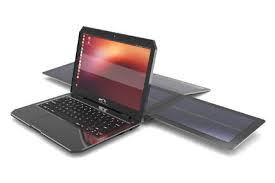A Canadian company, WeWi Telecommunications, will next week launch a solar-powered laptop that may soon find its way to North America.
WeWi Telecommunications has built an uneven and submersible laptop that’s designed to handle severe environments and quickly charge up on solar power that will cost only USD 350.
“We traveled to Africa and we saw the need,” said Snir, who noted a frustrating inability to get electricity when working in that country.
SOL will also be released in North America by the end of the year and its specs and capabilities may find appeal in the U.S. market.
The solar-powered SOL laptop could come to the U.S. later this year. It weighs about five pounds, and is about 2 inches thick at its highest point. But that’s part of the trade-off for having solar panels.
The four solar panels are little smaller than the 13.3-in. LCD display and open up in butterfly fashion. The panels are protected by the clamshell cover.
In sunlight, the solar panels can charge the replaceable battery in about two hours, however, in cloudy conditions; a full charge might take up to three hours. The battery can be used for eight to 10 hours, said Snir. The solar panels can be detached from the notebook and, connected by wire, placed in a sunny area to charge the unit while a user works at a desk or under a shady tree.
The system has been tested with Ubuntu Linux, which is being installed on it. But other operating systems are possible. In North America, Chromebook is one of the possibilities.
Chromebooks require an Internet connection, which is not a necessity in some regions of the world. For North America, “we are absolutely considering coming out with a version using Chrome,” said Snir.
The computer system is rugged, its shell made of fiber-reinforced polymers, the internal electronics has shock absorbers to help protect the system from falls. For USD 50 more, there’s a version that is submersible.
The system will support 3G and 4G networks, along with Wi-Fi, and it has SIM card support. There is an Intel Atom chip, and a 320GB hard disk drive. The SOL can support 2GB to 4GB of memory.
“We really want to get Africa connected and we really want to help developing countries,” he said. “We’re not out to make a huge amount for money from our laptops.”





